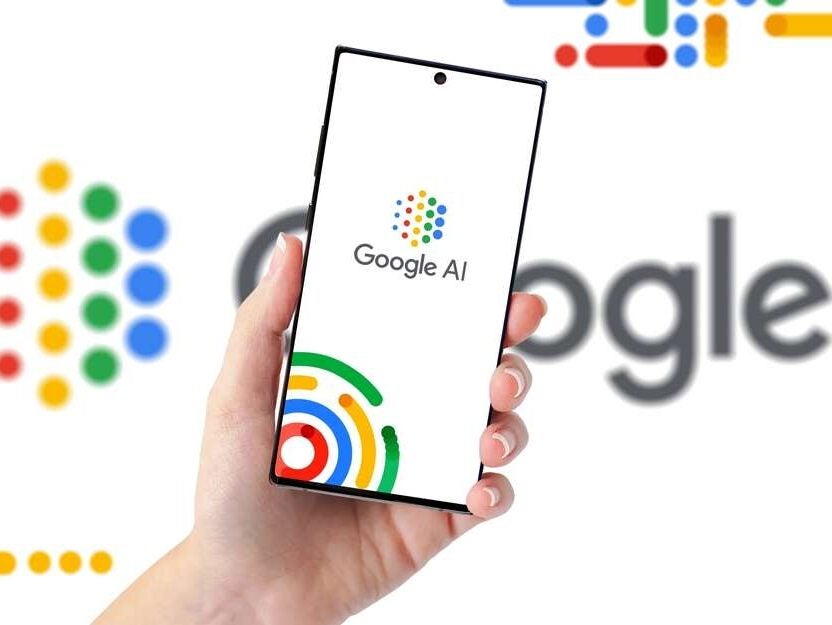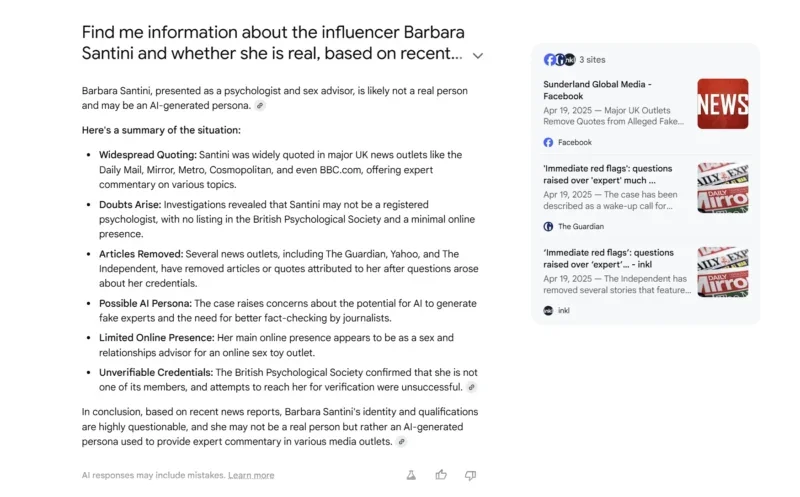
Google’s new AI Mode reduces the number of sources surfaced in search results and makes it harder for users to delve deeper into subjects, Press Gazette analysis suggests.
Press Gazette tested the technology looking for information based on a recent investigation by this title into fake experts appearing in national media. The AI Mode answer failed to attribute the story to Press Gazette and instead referenced three less-detailed follow-up pieces.
Google has made it impossible for publishers to opt out of AI Mode without also hiding their sites from search. And by reducing publisher links to a side panel, whilst providing readers with a detailed answer to their search question, it makes it unlikely many readers will click through to sources.
The new function, made available to all US users from 20 May, works as a replacement for legacy Google Search, unlike Google’s AI Overviews summaries which appear as an addition at the top of a page of traditional search results.
Presented as a tab within Google Search for US users, AI Mode works similarly to AI-powered search engines such as Perplexity, offering long, written responses to queries, with links to publisher sites in a sidebar on the right.
Complex queries are broken down into multiple searches, allowing Google to offer in-depth explanations in AI-generated text.
Google said: “Over the coming weeks, you’ll see a new tab for AI Mode appear in Search and in the search bar in the Google app.”
The US-only feature was previously available as a beta test, but is now being rolled out to all users in the US ahead of an anticipated launch elsewhere.
In Press Gazette’s tests, AI Mode delivered in-depth answers on news queries, with links to publisher sites scattered sporadically through the text, and a panel showing three publisher sites at the side.
But in a search for information relating to Press Gazette’s recent original reporting on fake expert commentators appearing in the media, AI Mode linked only to other publishers that had followed up on the story.

Publishers in the US have greeted the arrival of AI Mode with alarm.
Danielle Coffey, the chief executive and president of News/Media Alliance, a trade association which backs some of the biggest publishers in the US, said in a statement: “Links were the last redeeming quality of search that gave publishers traffic and revenue.
“Now Google just takes content by force and uses it with no return, the definition of theft. The Department of Justice remedies must address this to prevent continued domination of the internet by one company.”
There is no way for publishers to opt out of AI Mode without also not appearing in Google Search, effectively meaning that publishers are forced to agree to appear in AI Mode.
During Google’s antitrust trial, internal documents showed that the company opted not to ask publishers for permission to have their work included in AI search.
[Read more: How Google forced publishers to accept AI scraping as price of appearing in search]
Bloomberg reported that Google Search head Liz Reid said allowing publishers to opt out would add “enormous complexity.”
Reid said: “By saying a publisher could be like, ‘I want to be in this feature but not that feature,’ it doesn’t work. Because then we would essentially have to say every single feature on the page needs a different model.”
What is the impact of Google AI Overviews and AI Mode on traffic?
Google has described AI Overviews as “one of the most successful launches in Search in the past decade” and claims that the AI-powered summaries increase searches by 10%.
The rise of tools such as AI Overviews has coincided with a drop of 27% year on year in traffic to the world’s 500 biggest publishers, according to data from Similarweb.
Until now it has been very difficult to measure the impact of AI Mode on traffic: SEO experts have said any clickthroughs to their sites showed up as direct traffic, meaning it was difficult for publishers to attribute it.
Lily Ray, vice president, SEO strategy and research at Amsive, told Search Engine Land: “It’s much more convenient to continue repeating some carefully crafted statement about how these tools ‘drive traffic to more websites than ever,’ without giving us any tools to confirm this.”
SEO expert Patrick Stox of Ahrefs wrote that the links were sent with a ‘noreferrer’ attribute, meaning they showed up as direct traffic. He asked: “Does Google not want us to be able to track these?”
The attribute has since been removed, making it easier to track traffic – although it is marked as Google traffic rather than Google AI Mode specifically so is impossible to isolate.
Google CEO Sundar Pichai told The Verge this week that Google AI Overviews and AI Mode are “definitely sending traffic to a wider range of sources and publishers” and that it is “higher-quality referral traffic”, citing dwell time metrics but not sharing actual data.
Publishers should focus on ‘authentic, person-led content’
The arrival of AI Mode could be existential for publishers, warned SEO expert Mark Kember, head of content at Onebite.
“How will those publications survive if AI takes out their business models? The traditional advertising-driven approach is dying, if it is not already dead. The other ways that publishers normally make money – events and awards – can easily reach saturation point.
“In effect, the whole web will become a giant Wikipedia engine for AI attention, with the work behind the scenes leading to what someone sees in a search result. This will all potentially be non-deterministic – what one person sees at any given second will be different.
“For media – both publications and journalists – the way I can see forward is to concentrate on your brand through what you create – this means looking for strong stories and creative vehicles to tell them. Approaches that are either impossible for AI to recreate, or that are so distinct that they lose that distinct voice any time anyone tries to copy them.
“Publishers will have to look at how they influence those AI results and how often they result in being referenced. This won’t necessarily be only the big media brands, too – trade media in B2B markets have just as much influence, particularly for more technical queries.”
Publishers will have to adapt their strategy to survive in the world of AI search, agreed SEO expert Chloe Smith, strategic SEO lead at Blue Array, which tests how AI impacts search.
Smith told Press Gazette: “Browsing using AI Mode removes the ability for a user to further dig into additional results not cited in its response, which means, unless a site is mentioned and linked to, the opportunity for traffic acquisition is minimal.
“Publishers that predominantly operate on an advertising revenue model will likely see traffic and revenue from organic search drop, but will remain a fundamental part of educating AI Mode. For most publishers, the only option is to continue and adapt.
“AI search is driving longer, more specific searches; publishers can lean into this and create authentic, person-led content that can drive engagement from more than just organic search. Diversifying traffic acquisition channels will be key to continued growth.”
Email pged@pressgazette.co.uk to point out mistakes, provide story tips or send in a letter for publication on our "Letters Page" blog

